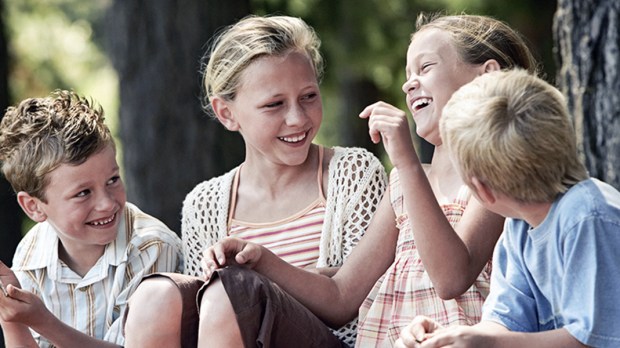When people find out I was homeschooled, their eyes widen as they assure me, “Well, you’re not that weird.” Fair enough. It’s odd to me, though, that most people expect homeschooled people to be anti-social monsters. They seem shocked that I can even make eye contact and seem to be leading a fairly normal, well-adjusted life.
When my wife and I had children, there was no question in our minds that they would be homeschooled. I’m fond of the experience I had as a child and wanted the same for our children, but I’ve been keeping a watchful eye on them to see if they might, in fact, be suffering from lack of socialization. Who knows, perhaps my experience was unusual? But — nope. The kids are just fine. In fact, they’re better than fine. At soccer, the coach says my son is by far the best listener – something my coach always said about me when I was a kid, too – and my daughters are friendly and open, willing to have conversations with all sorts of other kids and even adults. They play with the neighbors, compete on sports teams, and participate in scouting. They have birthday parties with friends and go on field trips.
My children aren’t unusual among their peers who learn at home, and it’s about time for the myth of unsocialized homeschoolers to disappear. We all have our reasons for how we choose to raise our children, and there are lots of good reasons to go to public school or parochial school, but when it comes to homeschooling, socialization is a concern that should barely register. Not only has it been a great fit for our family academically, but it is also a great form of socialization. I would go so far as to say that we homeschool because it’s so good at socialization. Here’s why:
Homeschooled kids are exposed to a wide range of people
My kids get plenty of time with children of the same age, particularly on their sports teams and through scouting. In homeschool, though, they also get to break out of their grade-specific group and spend time with kids of all ages. Field trips and co-ops often have them in the company of a wide range of diverse children. This means they gain experience from watching how older children behave and they learn patience and maturity when mentoring the younger children. Their learning environment actually mimics the old, one-room schoolhouse, which has its advantages. Specifically, it promotes enthusiasm, creativity, and collaboration.
Homeschooled kids spend more time with adults
When it comes to socialization, children are natural imitators and a great deal of their character development comes from those who are modeling behavior. It can be a good experience for kids to learn to negotiate the social environment of a school classroom and imitate other children, but it’s also incredibly important that they learn from socially mature adults. In specific, children best learn socialization from their parents. For this to happen, though, parents cannot lose their influence, and unfortunately this often happens when children are sent to school. Homeschoolers are more likely to avoid this transfer of influence. This is a great advantage for them.
Homeschooled kids avoid bullies
Bullies are a reality of life — even for adults. At some point, we need to learn to stand up to them. For most of us that time was back in grade school. For many, learning to deal with bullies is a formative experience and a helpful life lesson to absorb. For others, though, bullying is disastrous. It isolates them from their peers, stunts their social development, and leaves lasting emotional scars. Homeschooled children don’t have to waste energy and tears on being bullied. Yes, everyone at some point needs to deal with unpleasant people, but for that experience to become a positive opportunity for character-building, a child must be developmentally ready. Homeschool delays exposure to bullies and allows children emotionally prepare.
Homeschooled kids encounter real-life situations
A classroom is a controlled environment. There are tons of great teachers out there, but they don’t have as much opportunity as homeschoolers do to break out of the classroom and jump into real-life situations as part of the learning process.
For instance, my grade-school aged daughters recently decided to pay a fee for a table at a craft fair, created macrame plant holders and fairy dolls, and sold quite a bit of inventory. For this project to work, they researched techniques, bought materials, and dedicated time to their work. They dealt with all sorts of different people, including adult customers, handled their own money, and figured out the logistics of setting up a display. Because they’re homeschooled, they were able to combine their lessons with real-life application. If the goal of socialization during grade school is to prepare for real life, then homeschooling for the win on this one.
Again, homeschooling isn’t for everyone, but it’s a great option. If you’re considering it, don’t let myths about socialization hold you back. It’s really a great way to grow up.

Read more:
Why homeschooling is fast becoming the modern way to educate your kids

